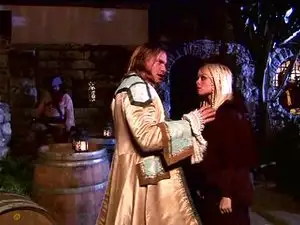Demon And Demeanour. Book 4 Of Poacher's ProgressChapter 10: Somerset And Cider free porn video

“It is a pleasure to finally meet you, Colonel Greenaway. I am Ivan Crossley, Senior Magistrate and deputy Lord Lieutenant of the County of Somerset. Welcome to Taunton.”
He rose from his desk and held out his hand. I had no idea I would be shaking the hand of Sir Boris Crossley’s brother, and brother-in-law of John Stafford, when I had left Coleman Hawkins in charge of seeing the regiment into their billets while I made myself known to the ‘civil authorities’ in the great hall of Taunton Castle.
Other than the thatch of straw-coloured hair Ivan Crossley bore little resemblance to his older brother, as he was at least half a foot shorter than Boris, and thinner – much thinner. His eyes were slate grey, with that disconcerting manner of seemingly able to bore deep into your soul, laying bare all your secrets and desires. I would not like to be interrogated by such a man. His demeanour was pleasant enough, but Ivan Crossley did not exude the affability of his brother – nor carry the paunch. He waved me into a chair opposite him.
“May I offer you some cider Colonel; made with last year’s crop from our own orchard?”
“I have been told cider appears to be an innocuous drink, but can lay a man out who is not used to the beverage?” I had seen men the morning after being drunk on cider, and it was not a pretty sight.
Crossley smiled and nodded “True, those who think cider a woman’s drink are surprised by the kick it can give. This particular cider — “ he pointed to a jug set on the table, “my Uncle Peter named Morning Dew, as it is as sparkling and refreshing as an early May morning.” He poured a glass and handed me it. I admit the drink was fresh and tasty, although not as flavoursome as Marlow Old Peculiar, or Boddington’s Special Brew.
“My uncle considers himself a vintner rather than a brewer, and it is he who has built up the reputation of Muscovy’ Gold cider to the high standard it enjoys today.” He noted my puzzled expression. “‘Muscovy’ is the name of the Crossley family home, in the village of Stogumber. My father married a Russian lady, hence my brother’s and my forenames, our sister’s name is Lara, which is also Russian in origin. But I will regale you with our family history later. First we must decide on the placement of your regiment.”
He unrolled a map on the desk, placing the jug of cider on one corner and his empty glass on the opposite. “I have been appointed deputy Lord Lieutenant of the county for the simple reason Sir Josiah Acland, the current Lord Lieutenant, is presently in London preparing to attend His Majesty’ s coronation. Sir Josiah is Bearer of the Royal Spurs, a complete anachronism in this modern age.” He frowned in exasperation. “The numbers of the King’s official attendants far surpass the numbers of peers who will be at the coronation ceremony. One wonders how they will all be accommodated in the Abbey.”
I nodded in agreement. “John Dymoke, my second in command, is attending the ceremony in his capacity of King’s Champion – another anachronism.”
Ivan Crossley let out a snort of laughter. “Well, he might have to engage in combat should someone challenge Fat George’s right to the crown, but have you ever seen our Gracious Majesty astride a horse?”
I shook my head. “Never.”
“Precisely, so what need has he of spurs?” Crossley said, and then shrugged. “No matter, we had better get down to the business of posting the companies of your regiment around the county in the most favourable positions to effect maximum security of the region.”
“I should inform you, Mister Crossley, the regiment has only eight companies, and not much more than six hundred and fifty men, surely not enough to patrol the entire county?”
“I have the authority to call out the Somerset Yeomanry if required,” he grimaced. “I would be severely censured if I did so during the stag hunting season. The Yeomanry is filled by members of the Mendip, Quantock, Brendon, and Exmoor Hunts.”
Crossley pointed to the map on the desk. “You need concern yourself only with this small part of the County, Colonel. This will be your area of operations: a rough quadrilateral, with Taunton at one corner, Watchet at another, Bridgewater another, and finally Combwich, at the mouth of the river Parrot on the Bristol Channel.” As he talked he pointed in turn to each location on the map. “This is the only region of the county where Captain Swing letters have been received.”
“Does this Captain Swing write such choleric letters they require a militia regiment to be deployed?” I said, nonplussed by the sense of absurdity his words conjured up.
He noted the blank look on my face. “You have not heard of the Swing Riots, which took place in parts of Kent and Essex?”
“My regiment was ordered to remain at Chippenham for three days; the galloper who brought the orders mentioned something of unrest in those two counties, but I have not heard of this Captain Swing fellow until now.”
Magistrate Crossley quickly appraised me of the eponymous Captain Swing and his followers, who send letters warning landowners, factory owners, and property owners, to mend their grasping ways or suffer retribution. Their anger is mainly directed at those landowners and factory owners who have been progressively lowering wages while introducing machinery; agricultural by the former, and in the weaving industry by the latter, and as a consequence employing fewer men. If the letters are disregarded and the lot of the working man not improved then other measures, such as machine breaking and barn burning, are adopted to persuade the employers to change their ways. Such as happened in Essex and Kent mere weeks ago.
“It seems to me these Swing people are latter day Luddites,” I said, “and General Ludd has been demoted to a captain.”
Crossley favoured my facetious remark with a chuckle. “You could well be correct, Colonel, but the latest additions to the Enclosure Acts, allowing landowners to fence in what had been common land, still rankles with the population in some parts of the kingdom. Thankfully, Somerset has not suffered the troubles of other counties as we have plenty of upland suitable for grazing; the Mendips, the Brendon Hills and the Quantocks, not forgetting Exmoor further to the west. The Somerset Levels never had common land, it being too fertile, and under water for three months of the year.”
I peered at the map. “This quadrilateral looks to be an area of between four and five hundred square miles, rather a large area to keep under surveillance; we must ascertain those villages best located to garrison a company, and then function as a base to conduct patrols.”
After another glass of Morning Dew, Crossley and I came to an arrangement of where best to post the regiment.
Two companies would be stationed in Taunton, guarding the castle, the law court, and the bridge over the River Tone.
Two companies would be posted at Bridgewater, which was some dozen miles to the north west of Taunton and about half its size. Bridgewater also had a castle, and a bridge over the River Parrot.
One company would garrison Watchet, a small fishing port on the Bristol Channel, more to dissuade smuggling, which was rife along the coast, than confront angry fishermen.
One company would be at Crowcombe, a village situated in the fertile vale running westward from Taunton, between the Brendon Hills to the south and the Quantock Hills to the north.
A company garrisoning Nether Stowey, on the northern slopes of the Quantocks, and another at Combwich, at the mouth of the River Parrot, were the final links in the deployment.
Each detached company could be readily reinforced, from either Taunton or Bridgewater, if unrest broke out, although Magistrate Crossley gave the impression all was sweetness and light in this part of Somerset, other than a few splenetic letters having been distributed.
I put myself in the place of the inhabitants of the villages where companies would be billeted. How would I feel if troops of militia from somewhere like Dorsetshire came swaggering around Grantham, carrying muskets and bayonets, and talking in an accent difficult to understand?
I determined to match the companies to locations where they, and more importantly their commander, would be tolerated, even if not warmly welcomed.
I chose Captain Parker’s Number Two Company to be based in Watchet. Charles Parker hailed from the fishing port of Grimsby, and we always made sure to be standing up wind of him when in conversation, the smell of fish hung round him like a miasma. He would have something in common with the inhabitants of Watchet, being able to talk to them with knowledge about their lives, while ignoring their fishy ambience.
Captain Armstrong’s Number Three Company would be posted at Crowcombe. Lewis Armstrong was the horticulturist and orchard owner who had named our Lincoln Longwool ram mascot, and would be able to discuss the growing of apples with the locals. In fact I hoped he would strike up a close association with Peter Crossley, who lived in the nearby village of Stogumber, as it was clear the Crossley family was held in high respect in the area.
For Nether Stowey I chose Captain Hampton and Number Five Company, as Lionel Hampton was something of a poet, although not a particularly accomplished or recognised one it is true. Nether Stowey had been the home of Samuel Taylor Coleridge, a much more takented and successful poet, and I expected Lionel to interact with those inhabitants of the village who had observed the burgeoning talent of Coleridge in a vain hope of acquiring some of the poet’s skill. Sadly, Coleridge was now residing at Highgate, north of London, with a mind addled by an over-consumption of opium.
- 17.07.2022
- 59
- 0




























































